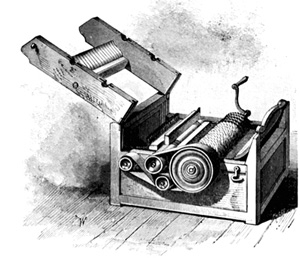
Whitney’s cotton gin was exceedingly important as it more than trebled the amount of cotton which could be picked free of seeds in a day. This stimulated the extension of the cotton plantations and the growth of Negro slavery in the south of the United States. In that way the cotton gin was indirectly responsible for the American Civil War.
Eli Whitney (1765-1825) was born in Westboro, Massachusetts. After graduating from Yale College in 1792, he became aware of the need for a machine which would separate cotton from its seeds. The Industrial Revolution was in-full flood and inventions such as John Kay’s flying shuttle (1733) and James Hargreaves’s spinning jenny (1769) had created a growing demand for raw cotton as the production of finished goods was now so much faster and easier.
Whitney produced, in only a few weeks, a hand operated machine or gin, and by April 1793 had built a machine that could clean 50 pounds of cotton fibres a day. It consisted of a wooden cylinder encircled by rows of slender spikes, set half an inch apart, which extended between the bars of a grid set so closely together that the seeds could not pass, although the lint was pulled through by the revolving spikes. A revolving brush cleaned the spikes and the seeds fell into an-other compartment.
The gin was immediately in great demand. Country black-smiths helped to fulfil the orders when the factory Whitney set up at New Haven, Connecticut, was unable to cope with all the orders. In the South, almost the whole region was given over to cotton growing, increasing the value of slaves and reinforcing the slave system, which had been declining.
Picture Credit : Google




